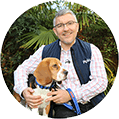It’s probably their most unappealing habit – so why do our dogs eat their own poop, or other animals’ droppings?
If you’ve ever caught your dog eating their own poop – or that of other dogs, foxes or cats – you’re far from alone. Poop eating (or coprophagia, to use the technical term) is a fairly common behaviour in dogs. In fact, one study found that 23% of owners have seen their dogs eating poop. The habit was even more common in households with more than one dog, with 33% of owners with three dogs reporting they’d witnessed this behaviour.
Is it normal for dogs to eat poop?
It may sound disgusting to us, but coprophagia is a natural behaviour in female dogs with puppies. For the first few weeks of a pup’s life, their mother will eat their poop to keep her litter and their living area clean. Sometimes puppies copy this behaviour, eating either their own faeces or that of other animals. While many grow out of the habit by around nine months, other dogs continue to eat poop into adulthood.
Why do dogs eat poop?
There is no definitive answer for what causes coprophagia in dogs, but there are many theories. It could simply be because the poop smells and tastes good to the dog. Our dogs’ senses are very different to ours, and if they are able to detect undigested fats and proteins in faeces, it may seem like a nutritious snack!
It’s thought that coprophagia is rarely caused by a lack of nutrients in a dog’s diet. But if your adult dog suddenly starts eating their poop regularly, it’s a good idea to pay a visit to your vet, in order to rule out any medical conditions that could be depleting your dog’s nutrient levels. Similarly, if your dog begins eating poop out of the blue after taking new medication, you should also speak to your vet, just in case the treatment is affecting the dog’s nutrient absorption.
Isolation, loneliness and boredom may also be a factor, as dogs who are kept alone are more likely to engage in poop eating. So, too, are dogs who are fed very close to where they defecate, as they may begin to associate the two smells. Stress may also contribute to canine coprophagia, particularly in dogs who are punished during house training and feel the need to eat their poop to hide the evidence. Attention-seeking behaviour may also be involved if the dog in question is trying to get a reaction out of their owner.
There have also been recorded cases in which a healthy dog will eat the faeces of another dog living with them who is weaker or ill, especially if the weaker dog becomes incontinent. It has been theorised that this is due to a canine instinct to remove evidence of weakness, in order to protect the pack from predators.
Is eating poop harmful to dogs?
While dogs eating their own poop is definitely not their most appealing habit, it’s usually harmless and not a major cause for concern. Eating the poop of other animals, however, could potentially carry health risks, if the droppings were contaminated with parasites, viruses or toxins. As ever, if your dog is displaying worrying symptoms, such as recurring diarrhoea, get them checked out by your vet. Remember to keep up with their routine worm treatments, too.
Interestingly, research suggests that dogs almost always favour eating poop that’s no more than two days old. This is the point at which the faeces of a dog infected with parasites begin to develop infective larvae. It’s possible that dogs snack on fresh droppings before these larvae have the chance to multiply, in a bid to reduce the risk of ingesting and passing on parasites – behaviour that may have been inherited from their wolf ancestors.
How do I stop my dog eating poop?
While no failsafe method has been found to stop a dog eating poop, there are some strategies you can try to discourage it. While punishing dogs for eating poop is unlikely to work, distracting them may be more effective. Monitor your dog, and if they approach a pile of poop, immediately call them back and offer them something more exciting, such as a treat, toy or a game.
If your dog eats their own poop, that of another dog in the household or cat poop from the litter tray, it’s important to remove temptation and clean it up as quickly as possible. It’s also worth keeping litter trays somewhere your dog can’t access.
Watch this video for practical advice on how you can prevent your dog eating poop.
Dogs with large appetites are more likely to be poop eaters, so it’s worth weighing your dog, then checking that the amount you’re feeding them corresponds to the manufacturer’s instructions. Bear in mind that, while underfeeding may tempt a dog to eat faeces, overfeeding may mean that partially digested nutrients are left in your dog’s poop, which can make it more appealing to eat. If you’re not sure your dog is getting a healthy diet, talk to your vet.
Remember that while eating poop may seem baffling to us, it’s a behaviour that comes far more naturally to our dogs. So, getting cross with them about it is only likely to confuse them! Try to be patient, make sure they’re eating healthily and getting plenty of mental stimulation, and be ready to offer them other interesting diversions.

Do you think we’re doing a good job? If you do, please vote for us in this year’s Insurance Choice Awards. Plus, you’ll also be entered into a prize draw to win £1,000 (Ts&Cs apply)
